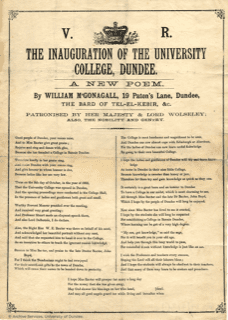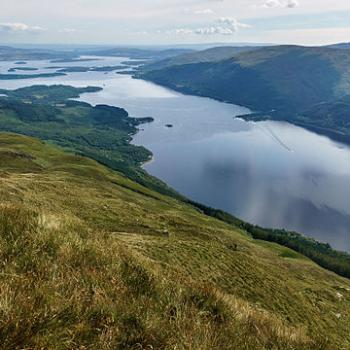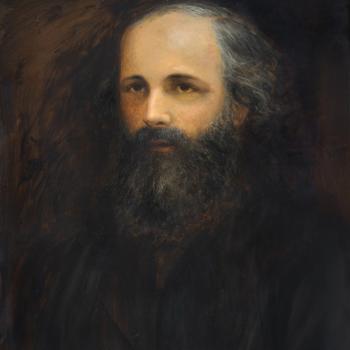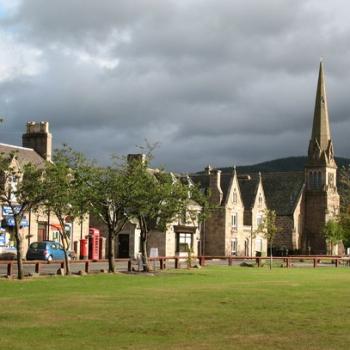
Poet and Tragedian / “I am your gracious Majesty / ever faithful to Thee, / William McGonagall, the Poor Poet, / That lives in Dundee.”
I have an anthology back home of the worst poems in the English language. It’s one of my most treasured possessions. Like Peter Schickele’s Definitive Biography of P.D.Q. Bach, and Kehlog Albran’s The Profit, it has brought tears of laughter to my eyes whenever I’ve opened it to sup from its pages. So it was an unexpected thrill today, while visiting Grayfriars Kirkyard during our walking tour of Edinburgh, to be shown the grave — or, anyway, a marker near the formerly unmarked grave — of William McGonagal (1825-1902), who is often (and with considerable justification) pronounced the worst poet of all time.
By the way, J. K. Rowling wrote her first Harry Potter book in the Elephant House, a coffee house adjacent to the Grayfriars Kirkyard. Aware of McGonagall, she loved the name and chose it for her “Professor of Transfiguration,” Minerva McGonagall.
Seeking some background information on this remarkable anti-titan of English literature, I found (and I recommend) a short essay by Joe Waterfield: “William McGonagall’s Life and Rhymes, And photographs from Victorian times: William McGonagall is remembered today as one of history’s worst poets, and his writing covered places and events from across Victorian Scotland. Joe Waterfield takes us on a trip through the HES archives that brings McGonagall’s poetry to life.”
Mr. Waterfield’s article begins with a quite faithful imitation of McGonagall at his poetic best:
In the year Nineteen Hundred and Two,
There was great sadness and to-do.
All the world did – alack – don a pall,
To mourn poor William McGonagallBefore he was cruelly struck down,
He was a poet of great renown.
His use of rhymes was very thorough,
Until he died in Edinburgh.When McGonagall performed his shows
The crowd showered him with potatoes
And other forms of vegetation
As a token of their admiration.

McGonagall’s specialty was poems about natural and man-made disasters — though, curiously, he never seems to have written a poem about his own public poetry recitals. Here’s a passage from the interesting Wikipedia article on McGonagall:
He found lucrative work performing his poetry at a local circus. He read his poems while the crowd was permitted to pelt him with eggs, flour, herrings, potatoes and stale bread. For this, he received fifteen shillings a night. McGonagall seemed happy with this arrangement, but the events became so raucous that the city magistrates were forced to put a ban on them. McGonagall was outraged and wrote a poem in response entitled “Lines in Protest to the Dundee Magistrates”:
Fellow citizens of Bonnie Dundee
Are ye aware how the magistrates have treated me?
Nay, do not stare or make a fuss
When I tell ye they have boycotted me from appearing in Royal Circus,
Which in my opinion is a great shame,
And a dishonour to the city’s name
Anyway, his most famous poem, and the work of his that is most frequently anthologized, is entitled “The Tay Bridge Disaster.” (My wife and I passed over a much more recent Tay Bridge just yesterday, coming down to Edinburgh from Stonehaven via Dundee, and I’m beginning to realize that, without planning to do so, we’ve been taking a William McGonagall Tour. He even made an uninvited visit to Balmoral, attempting to inflict his poetry upon poor Queen Victoria. But the gatekeeper refused him entrance and eventually threatened him with arrest if he didn’t leave immediately.) Anyway, here is “The Tay Bridge Disaster.” It’s about a disaster involving a bridge over the River Tay:
Beautiful Railway Bridge of the Silv’ry Tay!
Alas! I am very sorry to say
That ninety lives have been taken away
On the last Sabbath day of 1879,
Which will be remember’d for a very long time.‘Twas about seven o’clock at night,
And the wind it blew with all its might,
And the rain came pouring down,
And the dark clouds seem’d to frown,
And the Demon of the air seem’d to say-
“I’ll blow down the Bridge of Tay.”When the train left Edinburgh
The passengers’ hearts were light and felt no sorrow,
But Boreas blew a terrific gale,
Which made their hearts for to quail,
And many of the passengers with fear did say-
“I hope God will send us safe across the Bridge of Tay.”But when the train came near to Wormit Bay,
Boreas he did loud and angry bray,
And shook the central girders of the Bridge of Tay
On the last Sabbath day of 1879,
Which will be remember’d for a very long time.So the train sped on with all its might,
And Bonnie Dundee soon hove in sight,
And the passengers’ hearts felt light,
Thinking they would enjoy themselves on the New Year,
With their friends at home they lov’d most dear,
And wish them all a happy New Year.So the train mov’d slowly along the Bridge of Tay,
Until it was about midway,
Then the central girders with a crash gave way,
And down went the train and passengers into the Tay!
The Storm Fiend did loudly bray,
Because ninety lives had been taken away,
On the last Sabbath day of 1879,
Which will be remember’d for a very long time.As soon as the catastrophe came to be known
The alarm from mouth to mouth was blown,
And the cry rang out all o’er the town,
Good Heavens! the Tay Bridge is blown down,
And a passenger train from Edinburgh,
Which fill’d all the peoples hearts with sorrow,
And made them for to turn pale,
Because none of the passengers were sav’d to tell the tale
How the disaster happen’d on the last Sabbath day of 1879,
Which will be remember’d for a very long time.It must have been an awful sight,
To witness in the dusky moonlight,
While the Storm Fiend did laugh, and angry did bray,
Along the Railway Bridge of the Silv’ry Tay,
Oh! ill-fated Bridge of the Silv’ry Tay,
I must now conclude my lay
By telling the world fearlessly without the least dismay,
That your central girders would not have given way,
At least many sensible men do say,
Had they been supported on each side with buttresses,
At least many sensible men confesses,
For the stronger we our houses do build,
The less chance we have of being killed.
But my first acquaintance with the work of William McGonagall came via another of his immortal poems, entitled “The Albion Battleship Calamity.” It’s about . . . Well, I’ll let you try to work that out for yourself:
’Twas in the year of 1898, and on the 21st of June,
The launching of the Battleship Albion caused a great gloom,
Amongst the relatives of many persons who were drowned in the River Thames,
Which their relatives will remember while life remains.The vessel was christened by the Duchess of York,
And the spectators’ hearts felt light as cork
As the Duchess cut the cord that was holding the fine ship,
Then the spectators loudly cheered as the vessel slid down the slip.The launching of the vessel was very well carried out,
While the guests on the stands cheered without any doubt,
Under the impression that everything would go well;
But, alas! instantaneously a bridge and staging fell.Oh! little did the Duchess of York think that day
That so many lives would be taken away
At the launching of the good ship Albion,
But when she heard of the catastrophe she felt woebegone.But accidents will happen without any doubt,
And often the cause thereof is hard to find out;
And according to report, I’ve heard people say,
’Twas the great crowd on the bridge caused it to give way.Just as the vessel entered the water the bridge and staging gave way,
Immersing some three hundred people which caused great dismay
Amongst the thousands of spectators that were standing there,
And in the faces of the bystanders, were depicted despair.Then the police boats instantly made for the fatal spot,
And with the aid of dockyard hands several people were got,
While some scrambled out themselves, the best way they could–
And the most of them were the inhabitants of the neighbourhood.Part of them were the wives and daughters of the dockyard hands,
And as they gazed upon them they in amazement stands;
And several bodies were hauled up quite dead.
Which filled the onlookers’ hearts with pity and dread.One of the first rescued was a little baby,
Which was conveyed away to the mortuary;
And several were taken to the fitter’s shed, and attended to there
By the firemen and several nurses with the greatest care.Meanwhile, heartrending scenes were taking place,
Whilst the tears ran down many a Mother and Father’s face,
That had lost their children in the River Thames,
Which they will remember while life remains.Oh, Heaven! it was horrible to see the bodies laid out in rows,
And as Fathers and Mothers passed along, adown their cheeks the tears flows,
While their poor, sickly hearts were throbbing with fear.A great crowd had gathered to search for the missing dead,
And many strong men broke down because their heart with pity bled,
As they looked upon the distorted faces of their relatives dear,
While adown their cheeks flowed many a silent tear.The tenderest sympathy, no doubt, was shown to them,
By the kind hearted Police and Firemen;
The scene in fact was most sickening to behold,
And enough to make one’s blood run cold,
To see tear-stained men and women there
Searching for their relatives, and in their eyes a pitiful stare.There’s one brave man in particular I must mention,
And I’m sure he’s worthy of the people’s attention.
His name is Thomas Cooke, of No. 6 Percy Road, Canning Town,
Who’s name ought to be to posterity handed down,
Because he leapt into the River Thames and heroically did behave,
And rescued five persons from a watery grave.Mr. Wilson, a young electrician, got a terrible fright,
When he saw his mother and sister dead– he was shocked at the sight,
Because his sister had not many days returned from her honeymoon,
And in his countenance, alas! there was a sad gloom.Her Majesty has sent a message of sympathy to the bereaved ones in distress,
And the Duke and Duchess of York have sent 25 guineas I must confess.
And £1000 from the Directors of the Thames Ironworks and Shipbuilding Company.
Which I hope will hope to fill the bereaved one’s hearts with glee.And in conclusion I will venture to say,
That accidents will happen by night and by day;
And I will say without any fear,
Because to me it appears quite clear,
That the stronger we our houses do build,
The less chance we have of being killed.
The complete text of “The Albion Battleship Calamity” is available online here, along with helpful notes on the actual historical event that, umm, provoked the poem.
Posted from Edinburgh, Scotland













